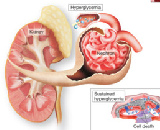Diabetes Mellitus (DM)
Diabetes

Diabetes mellitus (DM), commonly referred to as diabetes, is a group of metabolic diseases in which there are high blood sugar levels over a prolonged period. Symptoms of high blood sugar include frequent urination, increased thirst, and increased hunger. If left untreated, diabetes can cause many complications. Acute complications include diabetic ketoacidosis and nonketotic hyperosmolar coma. Serious long-term complications include cardiovascular disease, stroke, chronic kidney failure, foot ulcers, and damage to the eyes. Diabetes is due to either the pancreas not producing enough insulin or the cells of the body not responding properly to the insulin produced. There are three main types of diabetes mellitus,such as type 1 DM results from the pancreas's failure to produce enough insulin; type 2 DM begins with insulin resistance, a condition in which cells fail to respond to insulin properly and gestational diabetes.
Organism species: Mus musculus (Mouse)
- Disease model DSI521Mu01 Mouse Model for Diabetes Mellitus (DM) In Stock
- Disease model DSI521Mu02 Mouse Model for Diabetes Mellitus (DM) In Stock
- Disease model DSI521Mu71 Transgenic Mouse Model for Diabetes Mellitus (DM) In Stock
- Tissue TSI521Mu15 Mouse Tissue of Diabetes Mellitus (DM) In Stock
- Tissue TSI521Mu09 Mouse Tissue of Diabetes Mellitus (DM) In Stock
- Tissue TSI521Mu21 Mouse Tissue of Diabetes Mellitus (DM) In Stock
- Customized Service n/a Serums of Diabetes Mellitus (DM) (If Necessary) Serums Customized Service Offer
Organism species: Rattus norvegicus (Rat)
- Disease model DSI521Ra01 Rat Model for Diabetes Mellitus (DM) In Stock
- Disease model DSI521Ra02 Rat Model for Diabetes Mellitus (DM) In Stock
- Tissue TSI521Ra63 Rat Tissue of Diabetes Mellitus (DM) In Stock
- Customized Service n/a Serums of Diabetes Mellitus (DM) (If Necessary) Serums Customized Service Offer
Organism species: Cavia (Guinea pig )
- Disease model DSI521Gu01 Cavia Model for Diabetes Mellitus (DM) In Stock
- Disease model DSI521Gu02 Cavia Model for Diabetes Mellitus (DM) In Stock
- Customized Service n/a Tissue of Diabetes Mellitus (DM) (If Necessary) Tissue Customized Service Offer
- Customized Service n/a Serums of Diabetes Mellitus (DM) (If Necessary) Serums Customized Service Offer
Organism species: Oryctolagus cuniculus (Rabbit)
- Disease model DSI521Rb01 Rabbit Model for Diabetes Mellitus (DM) In Stock
- Disease model DSI521Rb02 Rabbit Model for Diabetes Mellitus (DM) In Stock
- Customized Service n/a Tissue of Diabetes Mellitus (DM) (If Necessary) Tissue Customized Service Offer
- Customized Service n/a Serums of Diabetes Mellitus (DM) (If Necessary) Serums Customized Service Offer
Organism species: Canis familiaris; Canine (Dog)
- Disease model DSI521Ca01 Canine Model for Diabetes Mellitus (DM) In Stock
- Disease model DSI521Ca02 Canine Model for Diabetes Mellitus (DM) In Stock
- Customized Service n/a Tissue of Diabetes Mellitus (DM) (If Necessary) Tissue Customized Service Offer
- Customized Service n/a Serums of Diabetes Mellitus (DM) (If Necessary) Serums Customized Service Offer


